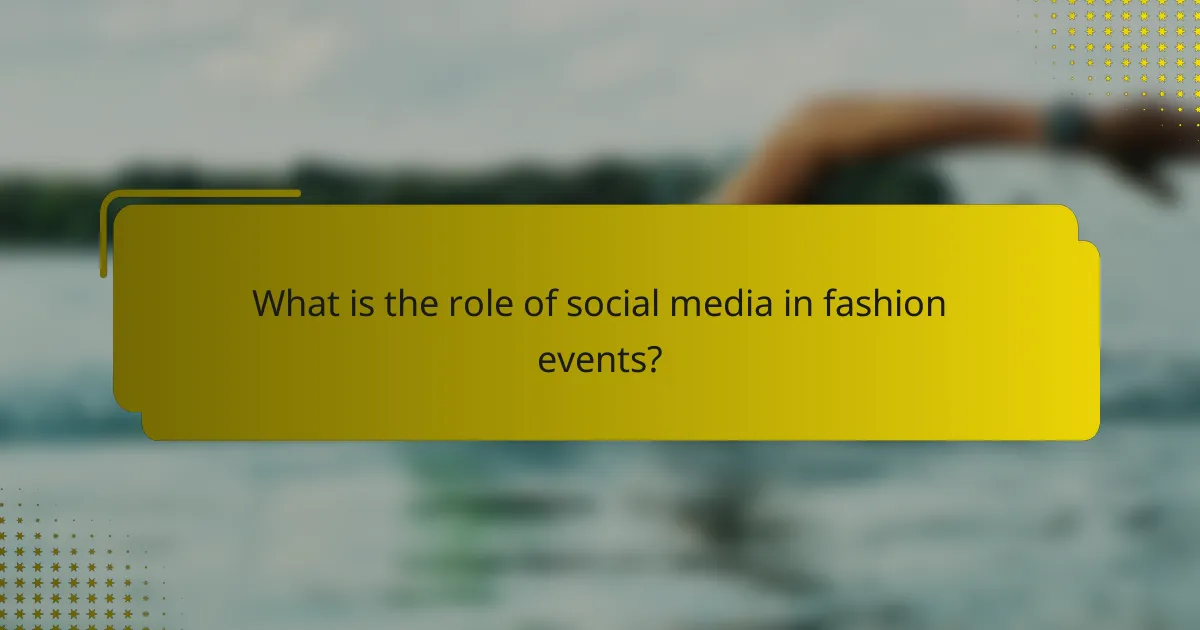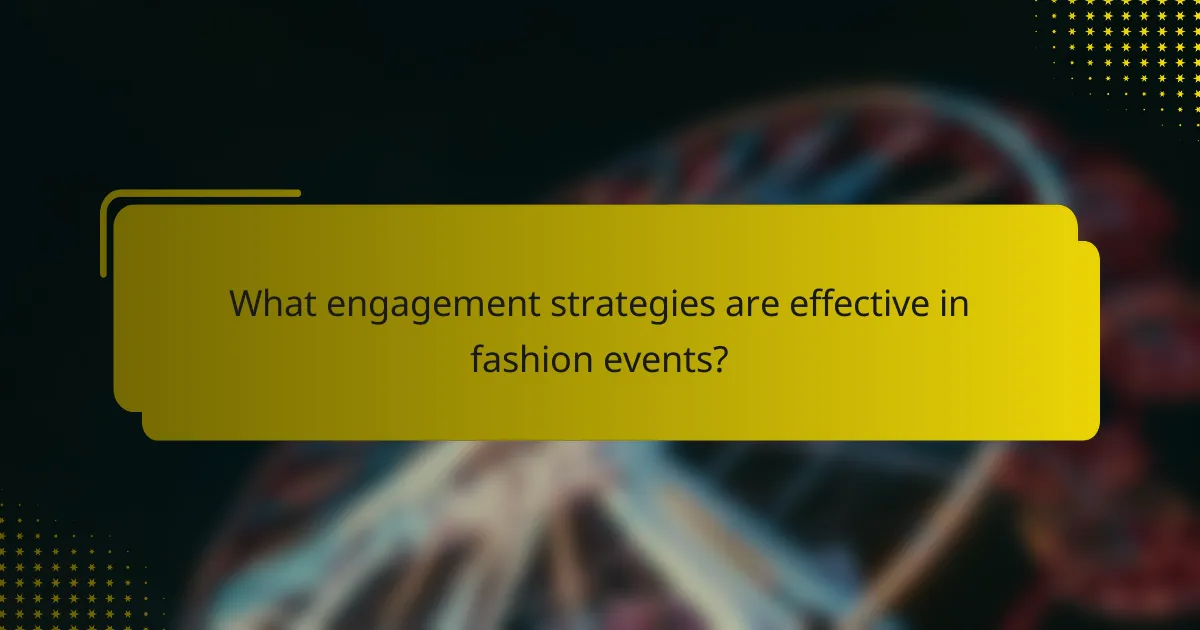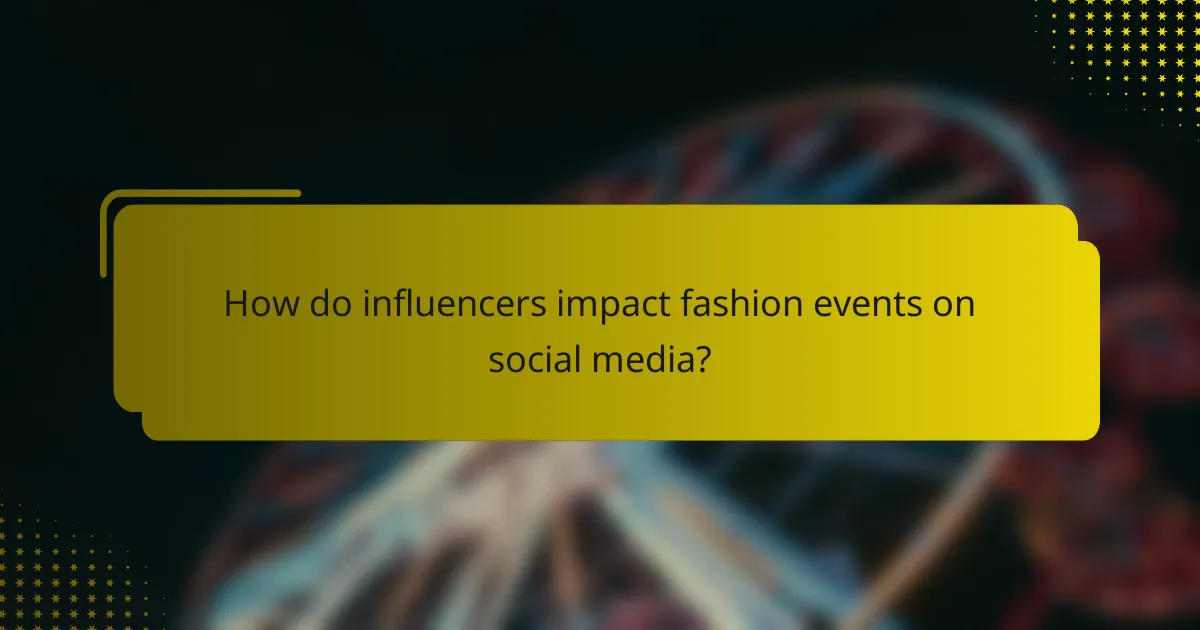
What is the role of social media in fashion events?
Social media plays a crucial role in fashion events by enhancing visibility and engagement. It allows brands to reach a wider audience instantly. Platforms like Instagram and Twitter provide real-time updates during events. This immediacy fosters interaction between designers and consumers. Influencers share live content, amplifying brand messages. Social media also enables user-generated content, creating a sense of community. According to a 2021 study by McKinsey, 75% of consumers engage with brands on social media during fashion events. This statistic highlights the platform’s significance in shaping consumer perceptions and driving trends.
How does social media influence the fashion industry?
Social media significantly influences the fashion industry by shaping trends and consumer behavior. Platforms like Instagram and TikTok allow brands to showcase collections in real-time. This instant visibility creates immediate consumer interest. Influencers play a crucial role in this process. They often set trends by sharing personal styles and outfits. Research shows that 70% of teenagers trust influencers more than traditional celebrities. Additionally, social media enables direct engagement between brands and consumers. This interaction fosters brand loyalty and community building. Overall, social media has transformed how fashion is marketed and consumed.
What are the key platforms used for fashion events?
Key platforms used for fashion events include Instagram, Facebook, TikTok, and YouTube. Instagram is widely recognized for its visual appeal and influencer collaborations. Facebook facilitates event promotion and community engagement. TikTok offers creative short-form video content that captures audience attention. YouTube serves as a platform for live streaming fashion shows and behind-the-scenes content. These platforms collectively enhance visibility and engagement for fashion events, making them essential in the industry.
How do these platforms enhance audience engagement?
Social media platforms enhance audience engagement by facilitating real-time interaction. They allow users to comment, share, and react instantly to content. This immediacy fosters a sense of community among followers. Platforms like Instagram and Twitter enable live updates during fashion events, increasing viewer involvement. Hashtags create a shared experience, allowing users to follow specific trends or events. According to a 2021 study by Sprout Social, 64% of consumers want brands to connect with them on social media. Engaging content, such as polls and Q&A sessions, further boosts interaction rates. These strategies collectively create a dynamic environment that keeps audiences invested and engaged.
Why is social media essential for fashion event promotion?
Social media is essential for fashion event promotion because it provides a vast platform for reaching diverse audiences. It allows brands to share real-time updates and engage with followers instantly. Platforms like Instagram and Facebook enable visual storytelling, showcasing designs and behind-the-scenes content. In 2021, 54% of fashion brands reported increased engagement through social media promotions. Additionally, social media facilitates collaborations with influencers, amplifying reach and credibility. Events promoted on social media often see higher attendance rates, as users can easily share and spread the word. Therefore, social media is a powerful tool for maximizing visibility and engagement in fashion events.
What strategies do brands use to leverage social media for events?
Brands use various strategies to leverage social media for events. They create event-specific hashtags to encourage audience participation. This allows attendees to share their experiences and connect with others. Brands also utilize live streaming to engage audiences in real-time. This approach can significantly increase event visibility and reach. Additionally, they collaborate with influencers to amplify their message. Influencers can attract a larger audience and enhance brand credibility. Brands often run contests or giveaways to boost engagement. This tactic incentivizes users to share content related to the event. Lastly, they analyze social media metrics to refine future strategies. This data-driven approach helps brands understand audience preferences and improve their event marketing efforts.
How does social media impact event attendance and visibility?
Social media significantly enhances event attendance and visibility. It allows for real-time promotion and engagement with potential attendees. Platforms like Instagram and Facebook enable event organizers to share updates and visuals that attract interest. Engagement metrics, such as likes and shares, help gauge audience excitement. Research shows that events promoted on social media see an increase in attendance by up to 30%. Additionally, social media facilitates targeted advertising, reaching specific demographics interested in the event. This targeted approach increases the likelihood of participation and awareness.

What engagement strategies are effective in fashion events?
Effective engagement strategies in fashion events include interactive experiences, social media integration, and influencer collaborations. Interactive experiences, such as live polls or Q&A sessions, increase audience participation. Social media integration allows real-time sharing of event highlights, enhancing visibility and engagement. Influencer collaborations leverage their reach to attract diverse audiences. According to a study by Eventbrite, 84% of event attendees are more likely to engage with events that utilize social media. Engaging content, such as behind-the-scenes footage, can also enhance audience connection. These strategies collectively create a vibrant atmosphere that fosters community and brand loyalty.
How can brands create impactful social media campaigns for events?
Brands can create impactful social media campaigns for events by leveraging targeted content and audience engagement. They should define clear objectives for the campaign, such as increasing awareness or driving attendance. Utilizing visually appealing graphics and videos can enhance the campaign’s attractiveness. Engaging with the audience through interactive posts, polls, and live Q&A sessions fosters community involvement. Collaborating with influencers can amplify reach and credibility. Timing is crucial; brands should post content strategically leading up to the event. Analyzing performance metrics post-event helps refine future campaigns. According to a 2022 study by Sprout Social, 70% of consumers are more likely to attend events promoted on social media.
What types of content resonate most with fashion audiences?
Fashion audiences resonate most with visually engaging content. High-quality images and videos showcasing outfits attract attention. Behind-the-scenes footage from fashion events generates interest. Influencer collaborations enhance relatability and trust. User-generated content fosters community engagement. Trend forecasts and styling tips provide value to followers. Interactive content, such as polls and quizzes, encourages participation. Data shows that 80% of consumers prefer visual content over text.
How can live streaming be utilized during fashion events?
Live streaming can be utilized during fashion events to reach a wider audience. It allows brands to showcase their collections in real-time. Viewers can experience the event as if they were present. This format increases engagement through interactive features like live chats. Brands can also gather immediate feedback from viewers. According to a 2021 report by McKinsey, live streaming can boost online sales by up to 30%. This approach also enhances brand visibility on social media platforms. Overall, live streaming transforms traditional fashion events into accessible, engaging experiences.
What role do hashtags play in fashion event engagement?
Hashtags play a crucial role in fashion event engagement by enhancing visibility and interaction. They categorize content, making it easier for users to find relevant posts. Fashion events often use unique hashtags to create a sense of community. This encourages attendees and online followers to share their experiences. According to a study by Sprout Social, posts with hashtags receive 12.6% more engagement than those without. Hashtags also facilitate real-time conversations during events, allowing brands to connect with their audience. Overall, they serve as a powerful tool for driving engagement and expanding reach in the fashion industry.
How can brands effectively use hashtags to increase reach?
Brands can effectively use hashtags to increase reach by strategically selecting relevant and trending hashtags. Using specific hashtags helps target the desired audience and boosts visibility. Incorporating a mix of popular and niche hashtags enhances discoverability. Research indicates that posts with at least one hashtag receive 12.6% more engagement than those without. Brands should also create unique branded hashtags to encourage user-generated content. Engaging with trending topics can further expand reach. Regularly analyzing hashtag performance allows brands to refine their strategy.
What are the best practices for hashtag campaigns in fashion events?
The best practices for hashtag campaigns in fashion events include creating a unique and memorable hashtag. This hashtag should be easy to spell and relevant to the event. Engaging influencers to promote the hashtag increases its visibility and reach. Encouraging attendees to use the hashtag during the event fosters community engagement. Monitoring the hashtag’s usage helps track its effectiveness and audience interaction. Analyzing the data from the campaign provides insights for future events. According to a study by Sprout Social, posts with hashtags can increase engagement by 12.6%. This statistic highlights the importance of effective hashtag strategies in maximizing audience interaction during fashion events.

How do influencers impact fashion events on social media?
Influencers significantly impact fashion events on social media by amplifying visibility and engagement. They create buzz around events through posts and stories. Influencers often have large, dedicated followings. Their endorsements can lead to increased attendance and interest in fashion shows. For instance, a study by The Fashion Institute of Technology found that influencer posts can increase brand engagement by up to 40%. Additionally, influencers provide real-time coverage of events, making them accessible to a wider audience. This democratizes fashion, allowing more people to participate virtually. Their authentic voices resonate with followers, enhancing brand loyalty.
What is the significance of influencer partnerships in fashion events?
Influencer partnerships in fashion events significantly enhance brand visibility and audience engagement. These collaborations leverage the influencer’s established follower base. Influencers provide authentic endorsements that resonate with their audience. This authenticity leads to increased trust in the brand. According to a study by the Digital Marketing Institute, 49% of consumers depend on influencer recommendations. Influencer partnerships also create buzz around events, driving social media conversations. This increased online chatter can lead to higher attendance and media coverage. Overall, these partnerships are crucial for maximizing the impact of fashion events.
How do influencers contribute to event marketing?
Influencers contribute to event marketing by amplifying brand messages and increasing event visibility. Their large followings allow them to reach diverse audiences effectively. Influencers create authentic content that resonates with their followers, enhancing engagement. They often share event experiences in real-time, generating buzz and excitement. Research shows that 49% of consumers rely on influencer recommendations for event participation. Collaborating with influencers can lead to higher attendance rates and improved brand perception. Their endorsements lend credibility, making events more appealing to potential attendees.
What metrics can measure influencer effectiveness at events?
Key metrics to measure influencer effectiveness at events include engagement rate, reach, impressions, and conversion rate. Engagement rate indicates how well the audience interacts with the influencer’s content. It is calculated by dividing the total interactions by the total followers. Reach measures the number of unique users who see the content. Impressions track the total number of times the content is displayed, regardless of clicks. Conversion rate reflects the percentage of audience members taking a desired action, such as making a purchase or signing up for a newsletter. These metrics provide a comprehensive view of an influencer’s impact and effectiveness during events.
What are the challenges brands face when working with influencers?
Brands face several challenges when working with influencers. One significant challenge is ensuring alignment between the brand’s values and the influencer’s image. Misalignment can lead to negative perceptions among consumers. Another challenge is measuring the effectiveness of influencer campaigns. Brands often struggle to quantify the return on investment from these collaborations. Additionally, managing influencer relationships can be complex. Brands may encounter issues with communication and expectations. There is also the risk of influencer controversies impacting brand reputation. These challenges require careful strategy and management to navigate effectively.
How can brands select the right influencers for their events?
Brands can select the right influencers for their events by aligning their values and audience with those of the influencer. First, brands should analyze the influencer’s niche and engagement metrics. This includes looking at follower count, likes, and comments. Next, brands need to assess the influencer’s past collaborations and content style. This ensures consistency with the brand’s image. Additionally, brands should consider the influencer’s reach within their target demographic. Research shows that 49% of consumers depend on influencer recommendations for purchasing decisions. Finally, brands can conduct interviews or meetings to gauge the influencer’s enthusiasm for the event. This helps ensure a genuine partnership.
What are common pitfalls in influencer collaborations for fashion events?
Common pitfalls in influencer collaborations for fashion events include misalignment of brand values. This occurs when the influencer’s image does not match the brand’s identity. Lack of clear communication can lead to misunderstandings about expectations and deliverables. Failing to establish measurable goals can result in ineffective campaigns. Additionally, overlooking the importance of audience engagement can diminish the impact of the collaboration. Not vetting influencers properly may lead to partnerships with those who have a history of negative behavior. Finally, neglecting to follow up post-event can waste the potential for ongoing relationships and future collaborations.
What are best practices for leveraging social media in fashion events?
To leverage social media effectively in fashion events, brands should create a dedicated event hashtag. This encourages attendees to share their experiences and increases visibility. Engaging with followers before, during, and after the event builds anticipation and maintains interest. Live streaming key moments can reach a wider audience beyond physical attendees. Collaborating with influencers can enhance credibility and attract their followers. Posting high-quality visuals showcases the fashion pieces and event atmosphere. Utilizing stories and reels can provide real-time updates and behind-the-scenes content. Analyzing engagement metrics post-event helps refine future strategies. According to a study by the Fashion Institute of Technology, 70% of attendees engage with event content on social media.
The primary entity of the article is social media and its role in fashion events. The article provides a comprehensive overview of how social media enhances visibility, engagement, and attendance at fashion events through various platforms such as Instagram, Facebook, and TikTok. It discusses effective engagement strategies, including influencer collaborations and the use of hashtags, which significantly impact consumer behavior and brand loyalty. Additionally, the article highlights the challenges brands face when working with influencers and best practices for leveraging social media to maximize event success.